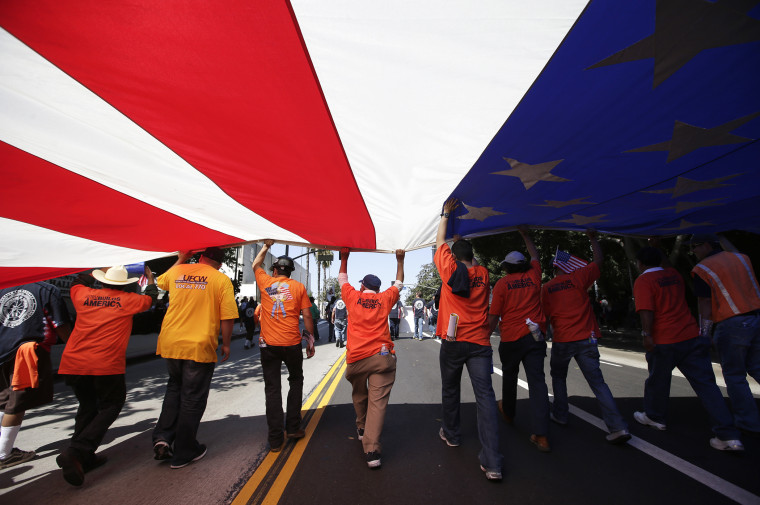As Democrats and Republicans grapple with immigration reform, the Pew Research Center is out with a new poll aimed at figuring out what immigrant communities want most out of a deal.
Their answer: stopping deportations.
By a 55 to 35 margin, Hispanic respondents told Pew they thought "being able to live/work in U.S. legally without fear of deportation" was a higher priority than "having [a] pathway to citizenship for those who meet requirements." The same was true for Asian respondents, who favored stopping deportations over a path to citizenship 49 to 44.
Given Republican concerns about citizenship, the results suggest that one compromise politicians have hinted at -- legalizing many of the undocumented while not providing them a clear path to naturalization -- might have legs.
According to Pew, 46% of Hispanic respondents and 59% of foreign-born Hispanic respondents said they worried "some" or "a lot" about either being deported or someone close to them meeting the same fate. The numbers were significantly lower for Asian respondents: 18% of foreign-born residents and 16% overall said they feared deportations.
Frank Sharry, executive director of pro-reform America's Voice, pushed back against the premise that Pew's results indicated a desire to sacrifice citizenship for legal status. He noted that 89% of Hispanic respondents and 95% of foreign-born Hispanics told Pew they support a path to citizenship -- hardly lukewarm support.
"Pitting an end to deportations against a path to citizenship is a false choice," Sharry told msnbc. "Immigration reform provides both an immediate end to the deportations and an eventual path to citizenship. One is relief right now and the other is full membership later. For the vast majority of immigrants it’s not 'either/or,' it’s 'both/and.'"
Democratic leaders, including Obama, have generally said a path to citizenship is absolutely necessary to any reform package, warning that a failure to include it would create a permanent group of second class Americans. Most major pro-immigration groups have said the same.
Not everyone on the activist side feels that way, however. The National Day Labor Organizing Network has identified stopping deportations as the more important short term goal, since citizenship can be addressed later, and cited the Pew study on Thursday to bolster their case. So did DRM Action Coalition, a group of young undocumented activists.
"Those debating the importance of citizenship need to be listening to those who live undocumented, those in detention centers, and those getting deported," Tania Unzueta, an organizer for NDLON, said in a statement. "Political equality starts with, and this debate actually moves forward when, people get to make the case for themselves instead of having their lives decided by others. One thing that's clear is that you can't decide your status preference if you're already deported."
For undocumented immigrants trying to make a living, the prospect of deportation is a constant source of anxiety and lack of papers can be a barrier to everything from finding better work to opening a bank account or getting a drivers license. And this concern isn't limited to those living in the United States illegally: many are married to legal permanent residents or citizens and many have children who were born in the United States. An earlier Pew survey from 2010 found 37% of all adult unauthorized immigrants had children who were American citizens. The threat of removal against one family member is a threat to the entire family.
Minority and immigrant rights groups have staged protests around the country over the last several years demanding President Obama slow or halt deportations in anticipation of immigration reform. Such efforts helped convince the White House to defer deportations for young undocumented immigrants in 2012, but the president has been reluctant to expand it to broader groups, claiming he doesn't have the legal authority. Deporations, which hit record highs earlier in his administration, are starting to slow, however.
Despite the ongoing debate between activists like Sharry and Unzueta, there's another good reason "citizenship vs. deportations" may be a false choice. House Republicans leaders have yet to endorse legalizing undocumented immigrants at all, let alone naturalizing them. Immigrant advocates may face a tough choice if they eventually come around to a half-loaf proposal, but the GOP has to offer it first.
